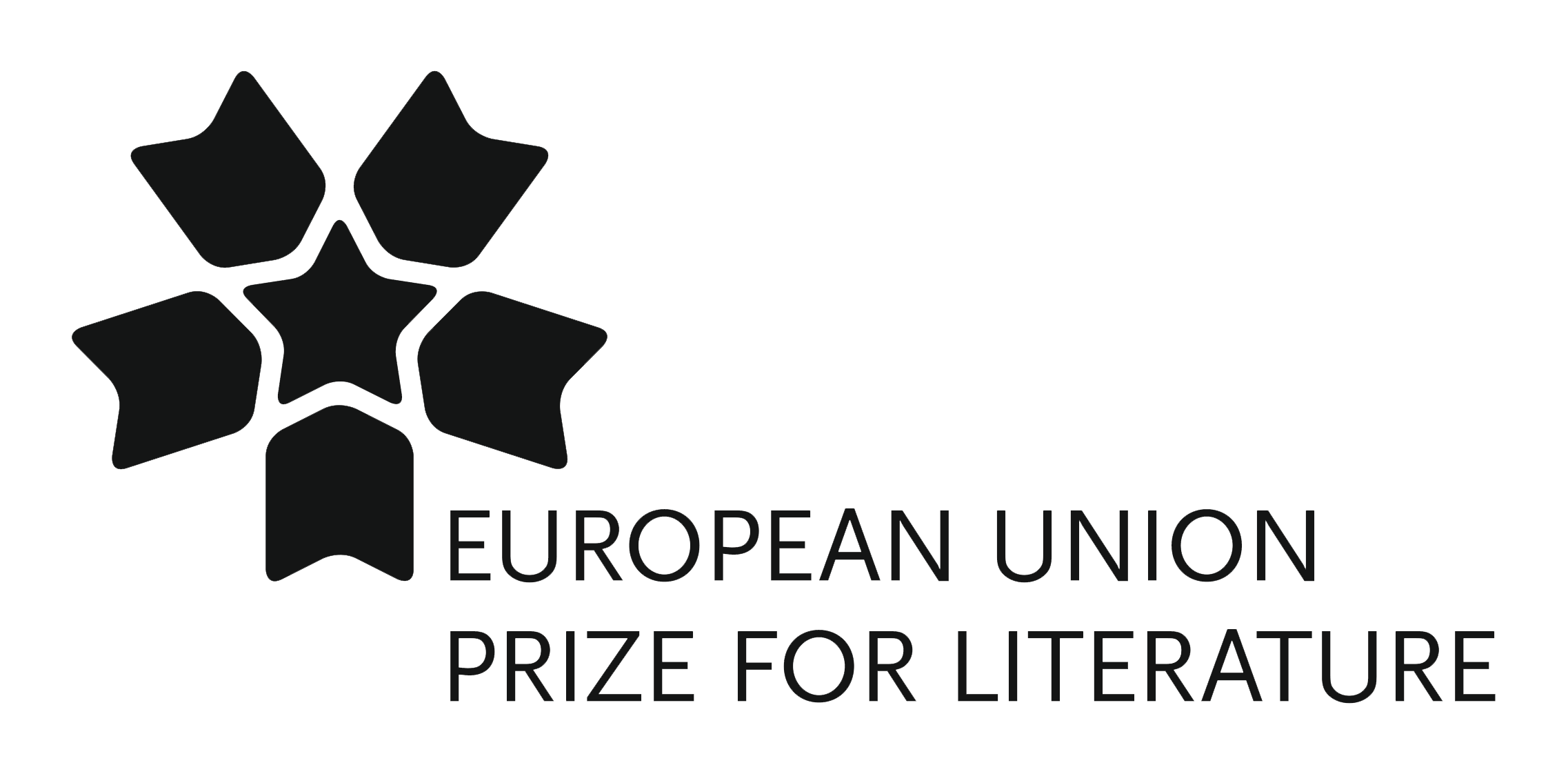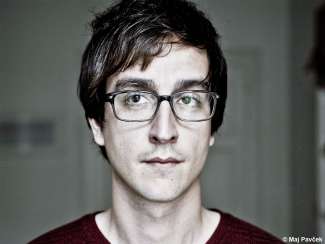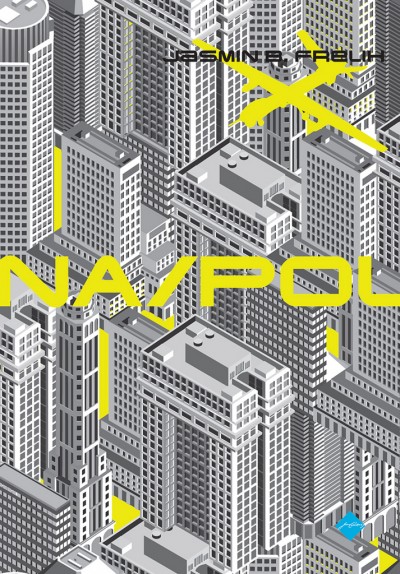Jasmin B. Frelih was born in Kranj, Slovenia, in 1986. He studied comparative literature, and literary theory and history, at the Faculty of Arts, University of Ljubljana.
His first novel Na/pol (In/Half) was published in 2013 by Cankarjeva Založba to considerable media attention and critical acclaim. It received the best literary debut award at the annual Slovenian Book Fair, was shortlisted for the novel of the year and book of the year awards, and was published in Dutch (De Geus, 2016), in English (Oneworld Publications, 2018), and Hungarian (Metropolis Media, 2019). His short story collection Ideoluzije (Tiny Ideologies) was published by LUD Literatura in 2015. His collections of essays Bleda Svoboda (Pale Freedom) was published by Cankarjeva Založba in 2017 and received the Marjan Rožanc Award for the best book of essays.
In his five years as a prose fiction editor for the literary review I.D.I.O.T., he worked with some of the best writers and poets of the new Slovenian literary generation. His short fiction, essays and translations of American authors appear in the leading Slovenian literary reviews Sodobnost, Literatura, and Dialogi.
Agent / Rights Director
Publishing House
Translation Deals
- Albania: Fan Noli
- Bulgaria: Nov Zlatorog
- Croatia: Naklada Ljevak
- Czech Republic: Větrné Mlýny
- English: Oneworld Publications
- Greece: Vakxikon Publications
- Italy: Safarà
- North Macedonia: Magor
- Hungary: Metropolis Media Group
- Netherlands: Uitgeverij De Geus
- Poland: Ezop
- Serbia: Zavet
- Turkey: Kalem Agency
- United Kingdom: OneWorld Publications
Excerpt
The shooting star sunk into the orange sky. The stars are knocking on clouds of smog and nobody comes to open up for them. Under this cover the people are deprived of light from the time of the dinosaurs. Somebody honks, somewhere. The scream of lonely, mechanical beasts. Dust pours down from the rooftops. The wind with its broom of salt. Off in the distance, the sea lazily turns on its side. The low tide has stripped the beaches, but they are not ashamed. The windows of the skyscrapers steal the light for themselves.
“I’m totally nervous,” the guitarist says and squeezes the neck of his guitar, like he’s strangling a duck.
“Why?” asks Zoja.
“I’ve never seen such a crowd of people.”
He stands by the stage exit, one eye fixed on the audience, and then he immediately looks away, his whole body shivering. Zoja takes a step towards him and to him this feels like a tacit threat. He’d like to concentrate on the music, on its autonomy, its independence from the instrument, on its effect, and not think of its causes, its human origin, which is why Zoja’s body, which from his perspective is getting bigger and bigger, unsettles him.
“Don’t be afraid,” says Zoja. In response he purses his lips, looks down and exhales sharply.
“Don’t be afraid,” she repeats. “There used to be no end to the crowds. These few hundred people are a drop in the ocean compared to the intertwined bodies that used to flock to much more awful things. Nobody has come to judge. They’ve come because they’re lonely. Because they’re afraid nobody understands them. Because they’re in a sad state.”
“That doesn’t really help me much,” he says quietly, pale in the face. “My music is just sound. It can’t do anything for anyone.”
“There are no demands here. They came to convince themselves whether anybody actually still believes.”
“I don’t know whether I believe.”
“It’s not your job to believe for them.”
“But if you said…”
“You just have to work your magic.”
“Work magic?”
“When you’re up there on stage and you’re running your fingers over the strings, just forget where you are. Forget about all that wood and all those stones and all that glass and all that nylon and steel and all those hearts and all those eyeballs, forget that time is passing, beat after beat, forget that everything that’s true is true. Step into the void that’s floating unseen in space somewhere beyond our galaxy. Don’t sing to the people. Sing to that empty space. There’s nothing there, just your sound. The only thing that exists is your sound. Your whole life is your sound. You weren’t born and you won’t die, as long as you’re in this place, and as long as this place is your sound. You have no parents, you have no children, nobody knows you. Nervousness? Nervousness is something you get on a train when the conductor comes to see if you’ve got a ticket. When a stranger asks you for a favour. When you’d like to say I love you to someone you don’t love. Nervousness is when you’re hungry. But you came to create. You came to light up the emptiness. You came to work magic. Leave the nervousness to them.”
“To them?”
“To those people who came for something.”
“What have they come for?”
“For something that nobody can give them.”
“…”
“Get out there, lose yourself, sing.”
A kaleidoscope of emotions washes over his face, his muscles twitch every which way and then suddenly stiffen and give themselves up to fate. But you know that face. It’s the one that floats in the mirror on those difficult mornings. Zoja gently nudged him forth and he stepped out, onto the stage, out, into the space, almost calmly.
/
“The buzzer hasn’t rung for years,” said Lefkas, as they were climbing the stairs. “At first I had no idea what was going on. Were you waiting for long?”
Evan breathed in the dry air and looked over the railing to the depths below. The staircase didn’t start on the ground floor, it went even deeper down. Flies were buzzing around him. Lefkas was dressed in a dirty pink bathrobe, his hair was dishevelled, and he was wearing slippers. Each step he took rattled the keys in his pocket.
“Not at all,” replied Evan. “It didn’t take long for me to find you.”
“And what got over you? What made you come for air?” asked Lefkas.
“For air?”
“From outside.”
“Is there some other way?”
Lefkas smirked. “Perhaps.”
Evan was not one for humour.
“I came for mAk.”
Lefkas stopped for a moment, but then moved on again with a quiet “aha.”
“What is this place?” asked Evan.
“It’s my home.”
“Home?”
“Everyone has one.”
They fell silent. Evan noticed a low roaring coming from the depths below and making everything vibrate. When he grabbed the railing, the vibration entered his bones.
“What is that?”
“No one knows,” replied Lefkas.
“How’s that, no one knows?”
“If you had time, I’d show you.”
“What? Why don’t you just tell me?”
Before going on, Lefkas stopped for a second, as if he were pondering very weighty matters.
“Down there, way down there, is a door of sorts without a handle and without hinges.”
“Then how can it be a door?”
“Well, I knew it would be tough to explain.”
Evan apologised and asked him to continue.
“The door won’t open, ever. People have tried and tried. It’s impossible to open it. I can’t even imagine how long there’s been a door there. Behind it there must be some who-knows-what making that annoying racket. Some sort of machine or reactor, what do I know. If you put your hand on the door, your whole body shakes. But I wouldn’t exactly say it’s a bad feeling, it’s just so, strong, you know, something you’re allowed to experience just once in your life, the second time one should beware. I don’t know if you’re following.”
“I’m following.”
Evan was following him.
“That’s more or less it, actually. I’m used to it by now. I’m not going to say I’m not interested in what’s up with it, but we can’t know everything, right?”
Evan exhaled loudly to shoo a fly away from his forehead. Lefkas looked at him and mumbled something indecipherable, something like insect, yes. When they were in front of the apartment door, he turned to Evan.
“Where’s your sponsor?”
“He died on me.”
“A replacement?”
Evan nodded.
“Do you know what happens when you go without for too long?” asked Lefkas.
Evan looked up in surprise.
“What do you mean, what happens? What is it that’s supposed to happen?”
Lefkas shook his head, gave a commiserative smile and turned the handle. They entered, but Evan didn’t stop.
“Wait, okay? What did you mean by that, by if I go too long without it? This morning it died out on me…”
Now it was Lefkas’ turn to be amazed, “A woman?”
“A woman, yes. Koito something, a few hours ago, I don’t know. What time is it anyway? What happens if you go without?”
The apartment looked uninhabited, except for a corner at the far end of a room where a lamp was shining above a stack of books. Orange foam was poking out of the innumerable holes in an armchair by a table. A carpet, grey and threadbare, led the way through the hall. From the photos hanging in cheap frames on the walls, the eyes of strangers stared out at Evan. None of them looked like Lefkas.
“Shut the door. Quickly, please. The flies.”
Evan shut the door.
“Tell me what’s going on.”
“Nothing,” replied Lefkas, to quieten him down. “Forget I even mentioned it. It doesn’t concern you.”
“How doesn’t it concern me? Didn’t you just say...”
Lefkas interrupted him with a raised hand.
“Believe me. You came here for a reason, so I’m not going to talk about time. We’re here. That’s everything.”
Evan blenched.
“Then what, what are you doing here?”
“I’m proclaiming the faith,” said Lefkas.
“That’s what you call it?”
Lefkas slumped into the armchair and spread his arms.
“It might seem a little funny to you. For you, mAk is a bit of a diversion, a joke, a thrill. Some little mind game, no? You don’t have to defend yourself, I know how it is,” he said when Evan hastened to object. “Just so you don’t think I’m judging you or anything. It’s completely legit, this. But do you know how many people out there are dead? Ever think about that? Masses of consciousness that suck the days through straws, or the days suck them. Loners. Good-for-nothings. Fools. Millions of them… With broken mirrors for company. Every minute they trip about in the shoals, every moment they want out, they want in, they want…”
Evan felt his lungs tightening up. He bent over to catch his breath.
“Are you alright?” asked Lefkas.
Evan had tears in his eyes. He nodded. He swallowed back a lump.
“How should I know what they want?” continued Lefkas. “For the world to have mercy on them? For them to have mercy on the world? My whole life I’ve been watching them. I know them well. And mAk is a simple combination. A little electricity smeared over the brain membrane, a few hormones released: neurotrophin, oxytocin, vasopressin and so on. Like I said, nothing special. If you’re in love, the brain itself releases all of this. But some people have never been in love. If you asked me, honestly, I’d have to say I’m doing charity. To exaggerate, I’m waking the dead. Are you alright?”
Evan’s throat was parched. He was desperately fighting back a tickle that would have led to incessant coughing.
“I’d like a glass of water,” he croaked.
Lefkas sprang up. “Where are my manners! Don’t be too offended,” he said on the way to the kitchen. “You can see I don’t get a lot of guests.” He disappeared through the door. Evan was beginning to sweat. He threw the gas mask on the table and skimmed the spines of the books. They were unfamiliar to him.
“Would you like some tea?” he heard from among clanging pots. “No, water, please, just water,” replied Evan. He ran a hand over his stomach. He hadn’t eaten yet. “Do you have something to munch on?” he asked, and winced at his words.
“To munch on?”
“If you have some food. Sorry, but I haven’t eaten anything today...”
Kitchen sounds. The swoosh of the refrigerator opening. Cling-clang, cling-clang. Evan rubbed his fingers over his temples. He relaxed in expectation. He would once again feel.
Lefkas tottered in with a glass in one hand and a plate of crepes in the other.
“I apologize. I hope they’re still good. They’re from yesterday. Unfortunately I used up all the jam, but I’ve got something else to put in them.”
Evan gave a shrug. He drained the glass in one go. He rolled a crepe. As he bit into it, he fell into a fountain.
/
Kras had already tied his tie when he looked at himself in the mirror and laughed at his own vanity. He stuck a finger into the knot and pulled it apart. He took off the tie and threw it to the floor. He doesn’t have much in his suitcase. An extra pair of shoes, a few shirts, underwear, socks, pants. If his path leads him north, or very far south, he’ll buy a coat at the airport. There’s nothing he really needs. And definitely not a tie.
He has no intention of saying goodbye. In any case he won’t be away from home for long and he doesn’t want to answer questions. Their presence is still alive in his head, gathered as they were at the celebration the day before, a family picture in living colour. Now they are once again dispersed into their frames, which is why he won’t visit them to convince himself before he leaves… Why does it seem like he’s fleeing? He’s never fled. Not even now when he probably should have. When the world became unhinged and when dangerous oaths were taken and hatred demanded its pound of flesh. Nowhere was it written that he’d succeed, that’d he’d survive, and if he found himself on the wrong side this time, he’d keep quiet forever. And neither is he fleeing now. He’s just going for his son, wherever he is. Just for his child. Though he’s no longer a child. He’s as old as Kras was when he still had a choice.
The sound of the zipper on the suitcase. The shadow of doubt on his face. When he still had a choice. He made a choice for himself. He made a choice also for everyone else. How could he leave a free path for his son, if he was born of a choice which set out and closed off the path for Kras? Fathers are selfish. Kras is well aware of this. There are some things a man must hold on to. Those are not just words. Those are not just memories. And freedom means nothing if you have it only in order to avoid what was chosen for you.
In the courtyard, the taxi is honking. Kras heads down the stairs and outside, where he glances up to his father, way up there, and snarls at the priest and rushed confessions. He’s not interested in what’s going on here. He and his father dealt with it a long time ago. Everything else was just a dull variation on a theme. Kras inherited the desert. To make something grow, he had to water it with blood. The truth of history presses on the sense of justice. In the strong, it bends. In the weak, it breaks. No one can see innocence, which is good, because it is nowhere.
He sits in the back seat and doesn’t look at the driver. He stares out the window as they drive. A few drops of rain loosen the cover of dust. The greasy clouds are showing off. There’s no sun. Evening is a long way off. Everything is captured here. His restless knees jump up and down, the leather heels and the rubber mat squeaking each time they make contact. Everything is captured here. Kras won’t let his eyelids interrupt the view, so his eyes begin to water. The landscape curves over the edges of the teardrops.
“Is there a…” he mumbles, and though the driver hears him, he has enough good sense to remain silent. “Is there something here that’s bigger than me?” asks Volk. The field bends. The woods at the edge blend with the sky. “Everything and more, at least something, a little beyond?” The colours of the sand and the blades of grass blend into a dirty green. He clenches his fist and runs his knuckles, firmly, slowly, against the glass. “Is there always a hole which sucks and sucks and won’t let the world fill up? And no matter how much you throw at it, it always wants more, and sucks and takes away the perfection of everything…!” He bangs his fist against the glass. The driver shifts in his seat, but remains silent. “What should I fill it with?”
“Excuse me, sir?”
“I said, what should I fill the hole with?”
“I wouldn’t know, sir.”
Kras nods, crosses his legs, turns his gaze from the horizon and closes his eyes.
“Mr Volk, before I can take you to the airport we have to go through a control point. I’m telling you right now you’ll have to take your shoes off.”
Kras bends down to untie his laces.
“Will we be there soon?”
“In a minute, Mr Volk.”
Just one more minute.
| Attachment | Size |
|---|---|
| EUPL_2016_SI_Jasmin_B_Frelih.pdf | 270.82 KB |


